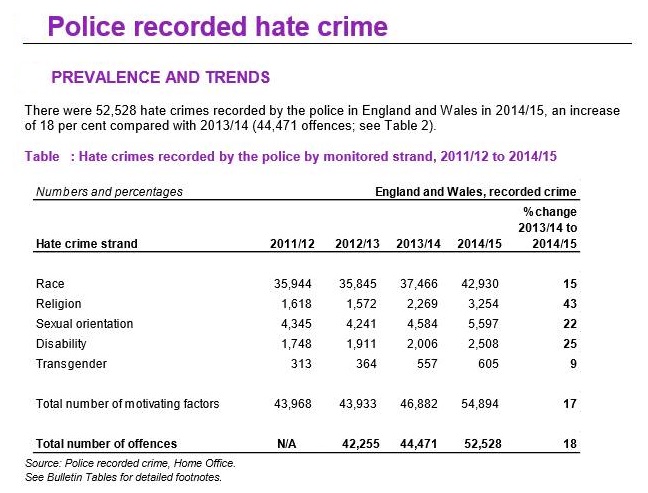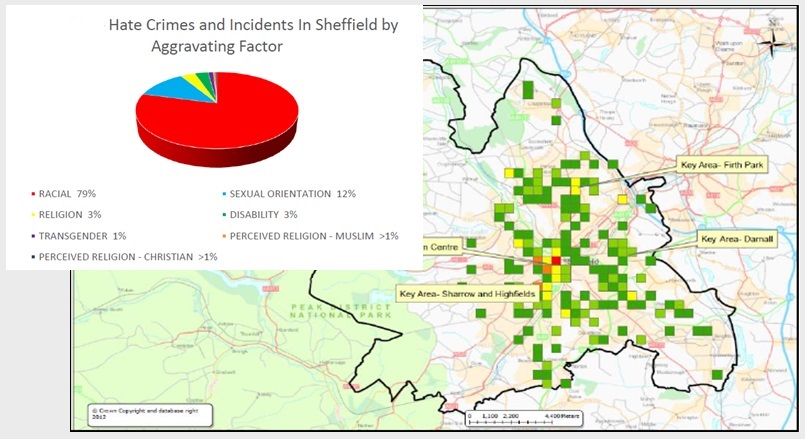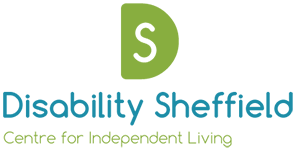Early September saw a joint Hate Crime event hosted by the Disability Hub and the Religion and Belief Hub as part of ongoing activities by the Equality Hub Network. Disability Sheffield volunteer and activist Deborah Sunday puts together some background to Hate Crime in the UK.
Everyone deserves respect, yet here in Sheffield people still face physical, verbal and other forms of attacks daily at home and in public due to their personal characteristic such as age; race; religion; sexual orientation; transgender and/or disability. In 2007, the UK criminal justice system defined Hate Crime as: “any criminal offence which is perceived, by the victim or any other person, to be motivated by hostility or prejudice towards someone based on a personal characteristic”. Sadly human rights rules, the Criminal Justice Act and the Equality Act 2010, have not stopped hate crime in the UK.
The Home Office said reported hate crimes in 2014/15 had risen to 52,528 compared to the 44,471 hate crimes in 2013/14. This was an 18% rise of which 2,508 (5%) were disability hate crimes. Hate crime in the UK is still under reported and a further rise in 2015 of hate crime figures was due to increased awareness by the police and support organisations. According to Level Playing Field Disability hate crime rose by 25%, however less than 4% was reported. Of the 48% hate crimes reported to the police, 13% were theft but 49% were violence.

Disability Sheffield together with Faith Star supported the Disability Hub and Religion and Belief Hub in hosting yesterdays action event on Hate Crime. In preparation for the event Deborah explains the meaning of disability hate crime in relation to disability hate incidence and disability discrimination; the impacts of disability hate crimes on victims, and ways to stop it.
Disability hate crimes include assaults; criminal damage; harassment; murder; sexual assault; theft; fraud; burglary; hate mail, alarm or distress, to a disabled person or someone perceived to be a disabled person. Early in 2015 Express News (2015) noted that 4,000 disability hate crime cases including verbal abuse, attacks on blue badge cars, kicking a guide dog, burning a wheelchair had all been brought to the Crown Prosecution Service since 2007.
“In July 2007 Christine Lakinski, a disabled woman, collapsed in a doorway on her way home. As she lay dying a man threw a bucket of water over her, covered her in shaving foam and urinated on her. One of his friends filmed the incident on a mobile phone”. From Getting Away with Murder.
A disability hate incidence can be a one-off incidence in public places such as hospitals and transport. It can also be continuous intimidations and harassments from caregivers; neighbours; local youths; friends and families; work places; classmates and teachers to mention a few.
For example, a disabled girl was attacked twice, her bag was grabbed and her wheelchair tipped so she fell on the ground both times. Another time, her wheelchair was stolen and later recovered by the police who asked her to drop charges against the thief because it would be a minor charge and avoid reprisal attacks.
Disability discrimination is being treated unfairly or differently from other people because of your disability. Disability discrimination can become a hate incidence if it involves hostility and violence which could lead to disability hate crime.
We are fortunate enough in Sheffield to have a forum in the Equality Hub Network where citizens from ‘protected groups’ can make sure the council are being ‘reasonably’ inclusive so all products and services, resources and opportunities should be fully accessible, usable, welcoming and functional for disabled people and non-disabled people.
However, many services are still difficult for disabled people even for those who attend Church or the Mosque. For example, Muslims with disabilities and their carers face challenges trying to participate in worship including lack of teachers to educate disabled Muslims and inability to obtain resources from Islamic centres. In accessibility of places of worship for disabled people of all denominations and faiths they face barriers, such as those with working dogs or those with wheelchairs and aids result in most disabled people praying in isolated areas. From Disabled World, 2016.
Barriers to stopping the occurrences of disability hate crime and hate incidences includes many disabled people do not know that abuses they suffer are hate crimes while some do not know where to report hate crimes.
Some disabled people may not report their experiences for fear of reprisal or continuous attacks while some disabled peoples’ experiences may not fall within the stated disability hate crime or hate incidences.
Some police stations in old buildings; no interpreter for deaf people; organisations not believing that disabled people could be attacked are also barriers to reporting disability hate crimes and incidents.
Disabled people should be encouraged to report offences to the police by calling 999 for crimes and 101 for hate incidents, otherwise report to support organisations like ‘True Vision’ online and not see attacks as part of life and suffer in silence. Reports should be taken seriously, investigated and brought to justice. More research into community disability hate crimes and justice taking against perpetrators can reduce disability hate. There should be further seminars like the ones taking place with the different Equality Hubs for families with disabled people and careers, communities and in schools. As a disabled person myself I hope this will help encourage greater cohesion and tolerance and for everyone to see there is no reason to accept disabled people as less human.
There also has to be regular counselling to disabled people and families victimised or facing attacks due to having impairment or belonging to a particular religion. We all need help on how to handle these issues and how we can collectively help to reduce or stop hate crime and incidents in UK.
One very positive step has already been taken in Sheffield where Stop Hate UK in conjunction with South Yorkshire Police have recently developed the first Hate Crime Scrutiny panel, to review the way in which South Yorkshire Police investigate incidents motivated by hatred or prejudice based on Race, Religion and Belief, Sexual Orientation, Gender Identity or Disability. Further information is available via Sheffield City Council and they even have a Facebook page.

As do the Disability Hate Crime Network whose website offers updates and the ability to share good and bad practice relating to disability hate crime, reporting centres, case outcomes and you can sign up to receive their free news updates.
Sheffield Voices are a group of people with a learning disability who meet at the Circle on Rockingham Lane. They are a self-advocacy group who get together to talk about what matters in their lives. You can view their Disability Hate Crime video here.
Deborah Sunday
Note The Hate Crime Scrutiny panel in Sheffield which meets to review the way in which South Yorkshire Police investigate incidents motivated by hatred or prejudice. Scrutiny Panel meetings are held each month at a venue in Sheffield City Centre. This month’s meeting is on Wed 14 Sep, 5.45pm, Town Hall. If you would wish to find out more about the scrutiny panel process and how you could be involved please contact andrew@stophateuk.org or call 0113 2935100.




